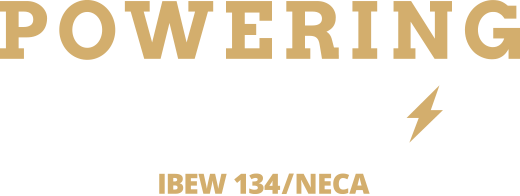iPower Electric’s inspiring path to becoming the first Arab American-owned IBEW Local 134 signatory contractor
- Posted: October 26, 2022
- Bahaa Khater, IBEW Local 134, IBEW Local 134 Signatory Contractor, iPower Electric, Isra Ali
“Anything negative, or bad, or hard that happens… try to see the positive of it, because it’ll motivate you to fulfill your dreams.” For as long as he’s been an electrical contractor, Bahaa Khater has held to the principle that setbacks aren’t the end of the road — instead, they’re challenges to be overcome. That mindset has helped Khater and his wife and business partner, Isra Ali, surmount countless hardships in their efforts to build a thriving, union-affiliated electrical contracting business.
Setbacks and an untraditional path to union affiliation
Long before Khater and Ali became the proud owners of iPower Electric, he worked as a high-voltage lineman at a Palestinian electrical company. While he enjoyed relative success as a journeyman electrician, Khater was determined to seek a new life — and ultimately, open his own business — in the United States.
Moving to the U.S. in 2014, Khater realized the path to becoming an electrical contractor wouldn’t be easy. “At first I made more money back home than when I went into training,” said Khater. “I was a full-fledged electrician there, but I was just a helper here.”
He had to surrender his title as a journeyman electrician and accept the lower title of apprentice while he pursued his studies at the IBEW/NECA Technical Institute (IN-Tech).
Additionally, while Khater speaks English as his second language, the language barrier made studying complex electrical work difficult. Eventually, he left IN-Tech to start his own business with his wife. With every job, the Khater/Alis continued to build iPower Electric. But it took years before they achieved their goal of becoming an IBEW Local 134 signatory contractor.
“We wanted to be union contractors because we wanted to land bigger jobs,” said Khater. “Otherwise, we couldn’t complete our dream of becoming professional contractors.”
In September 2022 their dream became a reality as they became the first Arab American owned IBEW Local 134 signatory electrical contractor.
Opening the door of opportunity for others
While proud of their achievements, the couple sees the broader impact for those of Middle Eastern descent who are looking to join the industry.
“We want to bring in our community as well,” said Khater. “To show them that there’s opportunity in the union electrical industry. This opportunity can provide a life-long career.”
The couple says that while dispelling negative stereotypes about unions in their community can sometimes be a struggle, they see success by building trust with customers and showing them the value in working with highly-skilled, highly-trained union electricians.
Scaling up a family-owned business
Throughout their struggles, one thing has remained constant: Khater and Ali have never stopped relying on the power of family to grow iPower Electric.
“Without the constant support of my wife and her help through difficult times, we wouldn’t be where we are,” said Khater.
As they look to the future, the couple hopes their children, Ali, 4, and Eileen, 2, will be part of the business someday.
“I’m hopeful that my children will join the business, each leading successfully with their unique strengths. I envision them pursuing engineering degrees and hopefully they’ll even invent new ideas and techniques after studying,” Khater said. “Although it will take hard work, we can get there with the right education.”
For Ali’s part, she’s committed to increasing the name recognition of iPower Electric. “Our goal would be to eventually become a well-known company that can start bidding on bigger jobs than we’re already taking,” said Ali. “Bringing the company name to increased recognition takes hard work and dedication. We are hoping that through networking events we are able to truly represent ourselves.”
While the Khater/Ali family has certainly seen its fair share of setbacks, they’ve been through enough now to know that roadblocks are just that — momentary challenges that can be overcome with time, hard work and determination.

